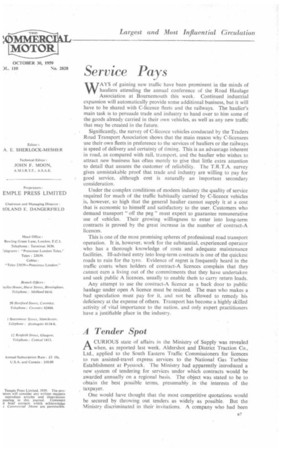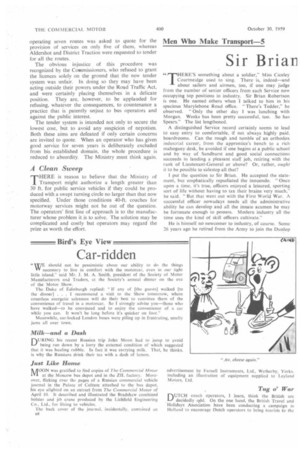Service Pays
Page 41

Page 42

If you've noticed an error in this article please click here to report it so we can fix it.
WAYS of gaining new traffic have been prominent in the minds of hauliers attending the annual conference of the Road Haulage Association at Bournemouth this week. Continued industrial expansion will automatically provide some additional business, but it will have to be shared with C-licence fleets and the railways. The haulier's main task is to persuade trade and industry to hand over to him some of the goods already carried in their own vehicles, as well as any new traffic that may be created in the future.
Significantly, the survey of C-licence vehicles conducted by the Traders Road Transport Association shows that the main reason why C-licensees use their own fleets in preference to the services of hauliers or the railways is speed of delivery and certainty of timing. This is an advantage inherent in road, as compared with rail, transport, and the haulier who wishes to attract new business has often merely to give that little extra attention to detail that assures the customer of reliability_ The T.R.T.A. survey gives unmistakable proof that trade and industry are willing to pay for good service, although cost is naturally an important secondary consideration.
Under the complex conditions of modern industry the quality of service required for much of the traffic habitually carried by C-licence vehicles . is, however, so high that the general haulier cannot supply it at a cost that is economic to himself and satisfactory to the user. Customers who demand transport "off the peg" must expect to guarantee remunerative use of vehicles. Their growing willingness to enter into long-term contracts is proved by the great increase in the number of contract-A licences.
This is one of the most promising spheres of professional road transport operation. It is, however, work for the substantial, experienced operator who has a thorough knowledge of costs and adequate maintenance facilities. Ill-advised entry into long-term contracts is one of the quickest roads to ruin for the tyro. Evidence of regret is frequently heard in the traffic courts when holders of contract-A licences complain that they cannot earn a living out of the commitments that they have undertaken and seek public A licences, usually to enable theth to carry return loads.
Any attempt to use the contract-A licence as a back door to public haulage under open A licence must be resisted. The man who makes a bad speculation must pay for it, and not be allowed to retnedy his deficiency at the expense of others. Transport has become a highly skilled activity ofvital importance to the nation, and only expert practitioners have a justifiable place in the industry.
A Tender Spot
ACURIOUS state of affairs in the Ministry of Supply was revealed when, as reported last week. Aldershot and District Traction Co., Ltd., applied to the South Eastern Traffic Commissioners for licences to run assisted-travel express services to the National Gas Turbine Establishment at Pyestock. The Ministry had apparently introduced a new system of tendering for services under which contracts would be awarded annually on a regional basis. The object was stated to be to obtain the best possible terms, presumably in the interests of the taxpayer.
One would have thought that the most competitive quotations would be secured by throwing out tenders as widely as possible. But the Ministry discriminated in their invitations. A company who had been operating seven routes was asked to quote for the provildon of services on only five of them, whereas Aldershot and District Traction were requested to tender for all the routes.
The obvious injustice of this procedure was recognized by the Commissioners, who refused to grant the licences solely on the ground that the new tender system was unfair. In doing so they may have been acting outside their powers under the Road Traffic Act, and were certainly placing themselves in a delicate position. They are, however, to be applauded for refusing, whatever the consequences, to countenance a practice that is patently unjust to bus operators and against the public interest.
The tender system is intended not only to secure the lowest cost, but to avoid any suspicion of nepotism. Both these aims are defeated if only certain concerns are invited to quote. When an operator who has given good service for seven years is deliberately excluded from his established domain, the whole procedure is reduced to absurdity. The Ministry must think again.
A Clean Sweep
THERE is reason to believe that the Ministry of Transport might authorize a length greater than 30 ft. for public service vehicles if they could be produced with a swept turning circle no larger than that now specified. Under those conditions 40-ft. coaches for motorway services might not be out of the question. The operators' first line of approach is to the manufacturer whose problem it is to solve. The solution may be complicated and costly but operators may regard the prize as worth the effort.




















































































































